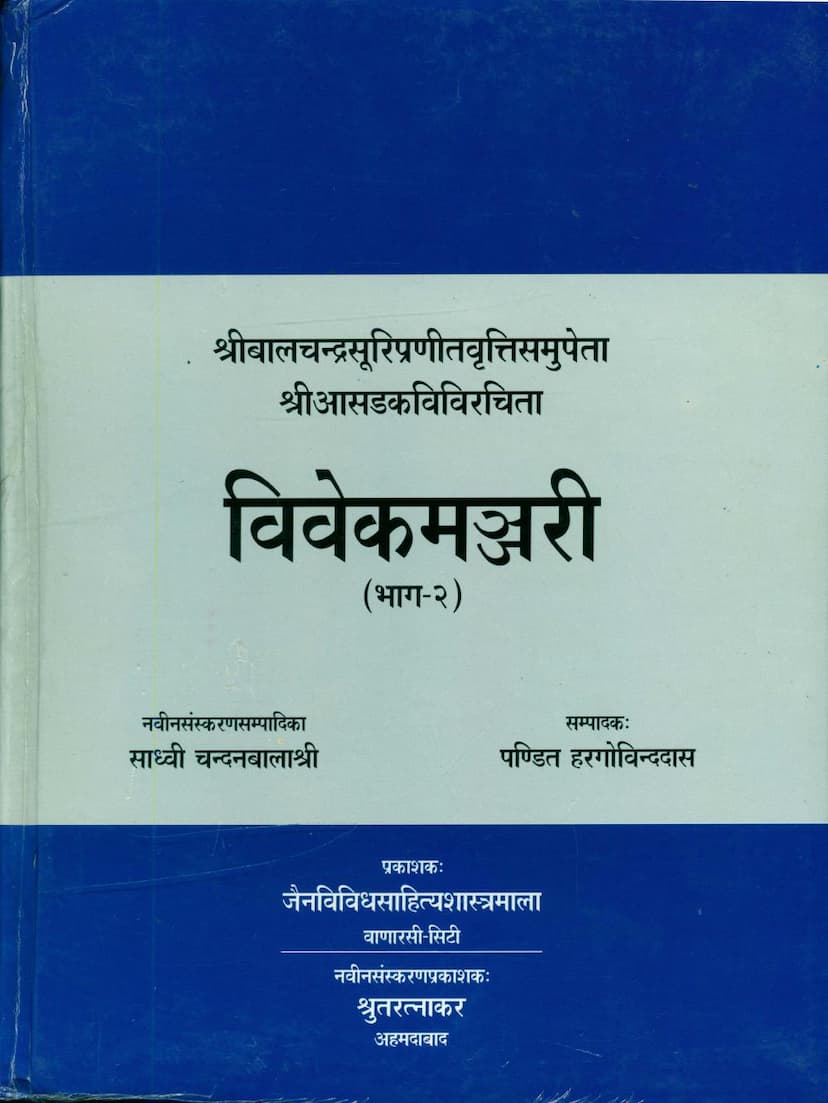Vivek Manjari Part 02
Added to library: September 2, 2025

Summary
This is a comprehensive summary of "Vivek Manjari Part 02," based on the provided Sanskrit text and catalog link.
Book Title: Vivek Manjari Part 02 (विवेकमञ्जरी भाग-२) Author(s): Sri Asad Kavi (श्री आसडकवि) with commentary by Sri Balachandrasuri (श्री बालचन्द्रसूरिप्रणीतवृत्तिसमुपेता) Editors: Pandit Hargovinddas (पण्डित हरगोविन्ददास) (Editor), Sadhvi Chandanbalashreeji (साध्वी चन्दनबालाश्री) (New Edition Editor) Publisher: Jain Vividh Sahitya Shastramala, Varanasi City (जैन विविध साहित्य शास्त्रमाला, वाराणसी-सिटी) New Edition Publisher: Shrutratnakar, Ahmedabad (श्रुतरत्नाकर, अहमदाबाद) Dedication: The new edition is respectfully dedicated to the memory of Param Pujya Jambuvijay Maharaj (परमपूज्य जम्बूविजय महाराज), a scholar and researcher of Jain Agamas and other philosophical texts. Publication Year: Vikram Samvat 2066 (2010 CE) Number of Copies: 500 Price: 500.00 Rupees
Overall Summary:
Vivek Manjari, authored by the renowned Jain poet Asad Kavi (circa 12th century CE), is a profound philosophical work in Prakrit verses. This second part, along with the Sanskrit commentary by Acharya Balachandrasuri (circa 13th century CE), elucidates key principles of Jainism. The text emphasizes the supreme importance of viveka (discretion, discernment, wisdom) as the ultimate eye and an uncaused benefactor. It highlights that manahshuddhi (purity of mind) is the adornment of viveka, much like a blossom adorns a tree, leading to the fruits of heavenly pleasure and liberation.
The core of the text, as outlined in the introduction and the table of contents, revolves around the four pillars that lead to manahshuddhi:
- Acceptance of the Four Refuges (Chatuh Sharan Pratipatti): Reverence and adherence to the path shown by Arihants, Siddhas, Acharyas (Sadhus), and Dhamma (Jain Dharma).
- Appreciation of Virtues (Gunanumodana): Commending and internalizing the virtues and exemplary lives of great souls.
- Condemnation of Wrongdoings (Dushkrit Garha): Recognizing and regretting one's own mistakes and wrong actions.
- Meditation on the Twelve Bhavanas (Dvadasha Bhavana): Contemplating twelve fundamental truths or reflections that lead to spiritual progress and detachment.
Key Themes and Content:
- The Nature of Viveka and Manahshuddhi: The book begins by establishing the significance of discernment and the necessity of mental purity for achieving true spiritual insight.
- The Four Pillars of Manahshuddhi:
- Four Refuges: The text details the importance of taking refuge in the divine beings and principles of Jainism.
- Appreciation of Virtues: A significant portion of Part 2 is dedicated to narrating the lives and exemplary conduct of virtuous women in Jain tradition (Mahasati). The summary of these narratives indicates stories of:
- Sita Devi: The life of Sita, a prominent figure, her trials, her unwavering virtue, and her eventual vindication are likely depicted.
- Rajimati: The story of Rajimati, possibly her renunciation or overcoming of worldly attachments.
- Madanrekha: Her life and virtues are presented.
- Dharmadanta (Dvandanti): The narrative of Devadanti is included.
- Vilasavati: The story of Vilasavati, her life and virtues.
- Anjanasundari: Her life and spiritual journey.
- Narmada Sundari: Her narrative.
- Kalaavati: Her life and virtues.
- Subhadra: Her exemplary conduct.
- Rishidatta: Her story.
- Mṛgavati: Her life and virtues. The text likely highlights their devotion, patience, chastity, and spiritual strength.
- Condemnation of Wrongdoings: This section likely delves into the consequences of negative actions and the importance of repenting and rectifying them.
- The Twelve Bhavanas: The text outlines the contemplative practices, such as contemplation of impermanence (Anitya Bhavana), non-attachment (Ananya-tva Bhavana), impurity of the body (Ashuchi-tva Bhavana), suffering in the cycle of existence (Samsara Bhavana), and others, which are crucial for spiritual purification.
- Commentary: Acharya Balachandrasuri's commentary is noted for its clarity and its inclusion of Sanskrit verses with classical examples to explain the Prakrit verses of Asad Kavi.
- Structure: The book is divided into detailed sections covering the various Bhavanas, the lives of the Mahasati, and other important aspects of Jain ethics and philosophy.
- Relevance: The introduction emphasizes that this book is essential reading for all spiritual seekers and inquisitive individuals. The revised edition aims to make this valuable text more accessible with modern typesetting and comprehensive appendices.
In essence, "Vivek Manjari Part 02" is a spiritual guide that aims to lead the reader towards inner purity and wisdom through understanding the teachings of Jainism, exemplified by the lives of virtuous individuals and the practice of profound contemplations.